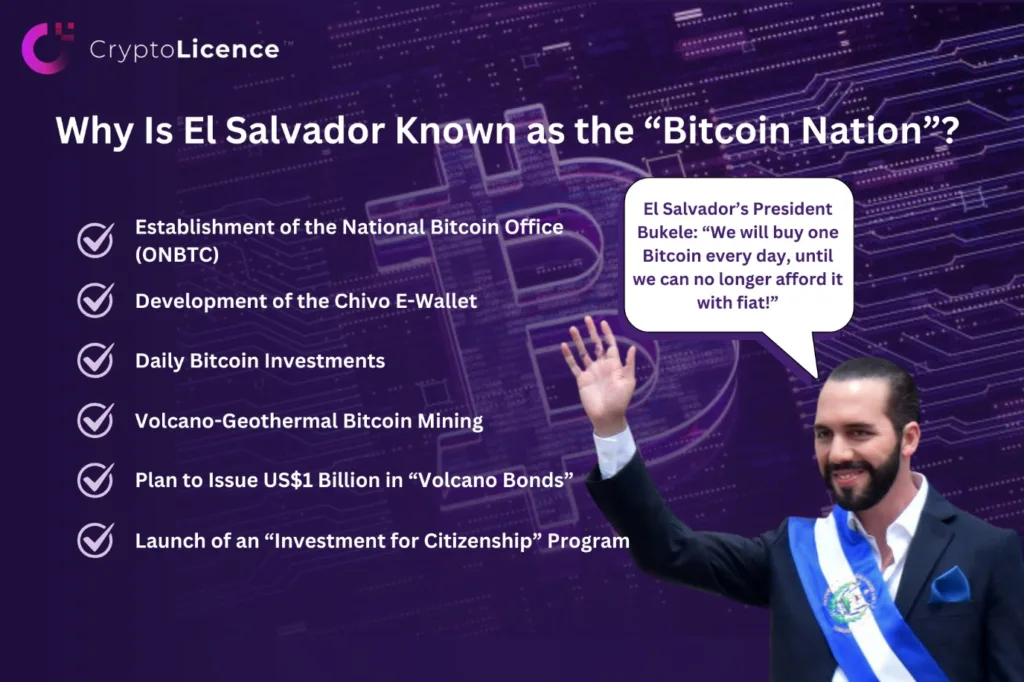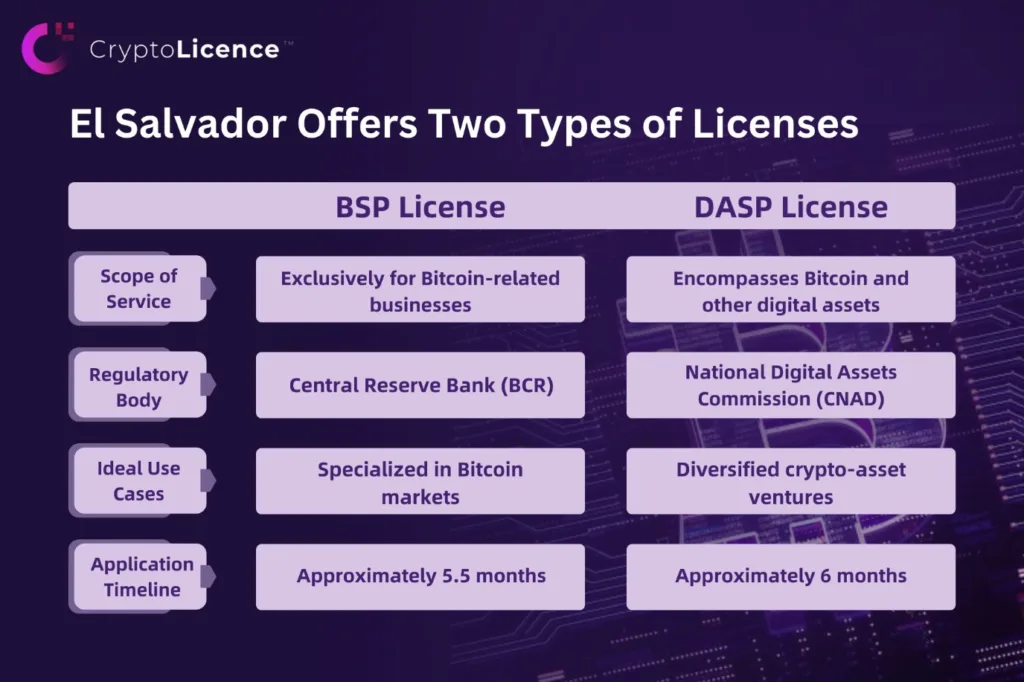
El Salvador Revokes Bitcoin’s Legal Tender Status! Are DASP and BSP Licenses Still Appealing?
El Salvador, once a trailblazer unafraid to break conventions, became the first country in 2021 to adopt Bitcoin as legal tender. However, under strong pressure from the International Monetary Fund (IMF)—tied to a US$1.4 billion loan—this bold “cryptocurrency experiment” was put on hold. On 29 January 2025, El Salvador officially revoked Bitcoin’s legal status. At first glance, this might appear to be a “step backward,” sparking questions: Will El Salvador’s meticulously built crypto ecosystem collapse? Can it still hold its ground in the global crypto wave? Let’s delve into the logic behind this change and glimpse the boundless potential that lies ahead.
Table of Contents
Why was El Salvador once dubbed the “Bitcoin Nation”?

Although El Salvador is one of the smallest countries in Central America, under President Nayib Bukele’s leadership it ignited a cryptocurrency revolution. Besides the audacious move of designating Bitcoin as legal tender, El Salvador also introduced a series of initiatives to create a crypto-friendly ecosystem:
- Established the National Bitcoin Office (ONBTC): Tasked with overseeing all crypto-related projects.
- Developed the Chivo wallet: Rolled out 200 ATMs nationwide supporting Bitcoin exchanges, making it easy for anyone to join the crypto economy.
- Daily Bitcoin purchases: So far, the country has amassed 6,119.18 BTC in reserves. Bukele famously declared in 2022, “We will buy one Bitcoin every day until we can no longer afford it!”
- Volcano-powered Bitcoin mining: Leveraging geothermal energy from state-owned power plants with 300 mining rigs. So far, around 473.5 BTC have been successfully mined.
- Proposed issuing US$1 billion in ‘Volcano Bonds’ to fund a visionary “Bitcoin City.”
- Launched an ‘Investment for Citizenship’ program: By investing US$1 million in Bitcoin or USDT, one can obtain El Salvadoran residency or citizenship.
From establishing dedicated agencies and building out infrastructure, to stockpiling BTC, mining with volcano power, issuing bonds to fill the national coffers, and offering innovative investment programs to attract the world’s attention—El Salvador has effectively joined the ranks of a new-era financial hub.
Is El Salvador Still a Bitcoin Oasis?
Even though El Salvador’s crypto policies have been controversial—and it recently revoked Bitcoin’s legal tender status—its carefully crafted crypto ecosystem has not disappeared. Quite the opposite: these endeavours have established El Salvador’s extraordinary reputation, with “Bitcoin” becoming its hallmark and drawing global investors’ gaze.
On January 13 this year, stablecoin giant Tether made a major announcement: after securing its Digital Asset Service Provider (DASP) license, the company would move its headquarters to El Salvador. Why here? Tether cited the country’s forward-looking policies, favourable regulatory environment, and a growing Bitcoin community—making El Salvador an ideal destination for companies leading the digital finance revolution. By embracing blockchain technology and digital currencies, El Salvador is cultivating an ecosystem that fosters innovation and welcomes investment. Not only is it quietly reshaping the future of finance, it’s also solidifying its position as a key global fintech player.
And Tether is not the only one. Bitcoin mining pool OCEAN has long since relocated its global headquarters to El Salvador, extolling its enormous potential as a hub for Bitcoin business innovation.
Bitcoin transactions in El Salvador also remain brisk. Whether local or foreign consumers—at shopping malls, hotels, roadside stalls, McDonald’s, Walmart, or even gas stations—daily trading volumes often exceed thousands of transactions.
Cathie Wood, founder of ARK Invest (nicknamed “the Wood Woman”), has praised President Bukele for using Bitcoin and AI to advance economic and educational reforms, predicting that in his current five-year term, El Salvador’s GDP may expand tenfold. Silicon Valley venture capital pioneer Tim Draper, founder of Draper Associates, has also lauded El Salvador’s embrace of Bitcoin, saying the country could become one of the world’s most affluent and innovative nations in 30 or 40 years.
Moreover, since the European Union’s MiCA regulations took effect, El Salvador’s crypto-friendly environment has become highly attractive to Virtual Asset Service Providers (VASPs). Far from being just a Bitcoin testing ground, El Salvador is rapidly evolving into a true “oasis” for the future of crypto.
Can an El Salvadoran License Save You Big Money?
For crypto businesses looking to expand, El Salvador is not just “crypto-friendly” in name; it also boasts substantial, concrete advantages.

- Affordable license application costs: The minimum share capital requirement can be as low as US$2,000—yes, you read that correctly! This “low-pressure” entry stands in stark contrast to markets where thresholds can run into tens of thousands of dollars, making El Salvador a potential paradise for small and medium-sized businesses.
- Tax exemptions for crypto companies: By registering with the Registry of Digital Asset Service Providers (RPSAD), you can enjoy a “zero tax” policy tailored to crypto businesses:
- Full exemption from corporate income tax: Ordinary companies face a 30% rate, but crypto firms pay none—profits are all yours!
- No tax on digital asset gains: Whether from buying, selling, transferring, or holding digital assets, both capital gains and regular income are untaxed.
- Exemption from goods and services tax: Digital asset transactions are exempt from taxes on the transfer of goods and services. Issuers, certifiers, and service providers also enjoy “zero” tax burdens.
- Waiver of withholding taxes: RPSAD-registered companies are not required to withhold tax on transactions, freeing up cash flow.
El Salvador’s BSP vs. DASP Licenses: Which One Suits You?
El Salvador offers two types of licenses—Bitcoin Service Provider (BSP) and Digital Asset Service Provider (DASP). Think of BSP and DASP licenses as two different “players” in the field. Here’s a quick comparison:

1. Service Scope: Specialized vs. Diverse
- BSP License: Geared exclusively toward Bitcoin-based services. It allows you to provide Bitcoin-fiat exchange, payment processing, and custody—ideal for companies focused solely on Bitcoin.
- DASP License: Offers a broader range of services. Beyond Bitcoin, it covers Ethereum, Litecoin, and more, including trading, custody, derivatives, and even stablecoin issuance. Perfect for companies aiming to be a “jack of all trades.”
2. Regulating Body: Central Bank vs. Specialized Committee
- BSP License: Regulated by the Central Reserve Bank (BCR), with an approval process focused on stability in the Bitcoin ecosystem.
- DASP License: Overseen by the National Digital Assets Commission (CNAD), covering a wider scope and emphasizing the compliant development of the entire digital asset market.
3. Use Cases: Niche vs. Comprehensive
- BSP License: Reflects El Salvador’s “Bitcoin Nation” identity, suitable for those exploring opportunities in Bitcoin payments or remittances.
- DASP License: Better for businesses with more ambitious, diversified offerings—exchanges, wallet services, or projects looking to launch new tokens can tap into altcoin or broader blockchain trends.
4. Application Process: Streamlined vs. Flexible
- BSP License: Takes about 5.5 months, with a more streamlined procedure—ideal for businesses wanting a faster launch.
- DASP License: Requires about 6 months due to the broader business scope and stricter compliance obligations. It’s more complex but also offers greater flexibility and utility.
Apply for an El Salvadoran License with Cryptolicence!
Whether you opt for a BSP or DASP license, El Salvador welcomes you with open arms. This land of volcanoes and Bitcoin brims with untapped potential, waiting to be discovered!
Securing the right license is the critical first step toward success. From deciding between BSP or DASP licenses, accurately calculating application costs and timelines, assembling a compliant team, and registering an SRL company, to drafting and revising applications, submitting documents, and preparing for interviews—navigating these interconnected steps can be daunting. That’s where a professional compliance team becomes indispensable.
Cryptolicence is your most trusted partner! We offer complete end-to-end support, from project management to help you plan out a clear application roadmap, to thorough document preparation ensuring seamless compliance. We also provide concise coaching so you can approach the approval process with confidence, plus customized add-on services to meet your unique needs. Let us take the hassle out of every step!
Get in touch with Cryptolicence now to bid farewell to complicated procedures, easily secure your license, and leverage El Salvador’s licensing advantages to carve out a share of the burgeoning crypto market!